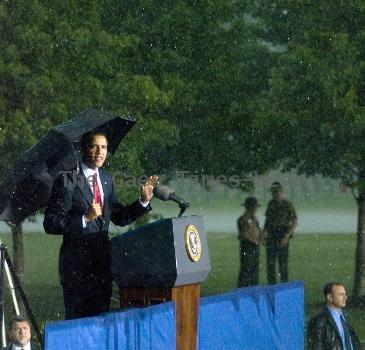US, nuclear powers to join Hiroshima memorial for first time, on 65th anniversary of attack
By Eric Talmadge, APThursday, August 5, 2010
US, nuclear powers to attend Hiroshima memorial
HIROSHIMA, Japan — The site of the world’s worst atomic bomb attack echoed with choirs and Buddhist prayers Thursday as Hiroshima prepared to mark its biggest memorial yet and the first to be attended by the U.S. and other major nuclear powers.
Washington’s decision to send U.S. Ambassador John Roos to the 65th anniversary was seen by many as potentially paving the way for President Barack Obama to visit Hiroshima — which would be unprecedented for a sitting U.S. leader.
Along with the U.S., Britain and France were also to make their first official appearance at the memorial Friday, along with U.N. Secretary-General Ban Ki-moon. Altogether, 75 nations were to be represented.
China, which sent a low-ranking official in 2008, was not participating. Officials said it did not give a reason.
Hiroshima strongly tries to ensure that the memorial — while honoring the 140,000 who died on or soon after the attack on Aug. 6, 1945 — emphasizes a look-forward approach, focusing not on whether the bombing was justified, a point which many Japanese dispute, but on averting a future nuclear attack.
Ban, who visited Nagasaki on Thursday before arriving in Hiroshima, said this year’s memorial will signal strongly to the world that nuclear weapons must be destroyed.
“The only way to ensure that such weapons will never again be used is to eliminate them all,” he said. “There must be no place in our world for such indiscriminate weapons.”
Washington’s decision to attend the anniversary has been welcomed by Japan’s government, but has generated complex feelings among some Japanese who see the bombing as unjustified and want the United States to apologize.
“Americans think that the bombing was reasonable because it speeded up the end of the war. They try to see it in a positive way,” Naomi Sawa, a 69-year-old former teacher, said after paying her respects to the dead. “But we were devastated.”
About 140,000 people were killed or died within months when the American B-29 “Enola Gay” bombed Hiroshima on Aug. 6, 1945. Three days later, about 80,000 people died after the United States attacked Nagasaki.
Japan surrendered on Aug. 15, ending World War II.
Concerns that attending the ceremony — an emotional event beginning with the offering of water to the dead and the ringing of a bell to soothe their souls — would reopen old wounds had kept the U.S. away until this year.
Former President Jimmy Carter visited Hiroshima’s Peace Museum in 1984, years after he was out of office. The highest-ranking American to visit while in office is House Speaker Nancy Pelosi, who went in 2008. Roos also visited Hiroshima soon after assuming his post last year.
None went for the annual memorial, however.
Secretary of State Hillary Clinton told reporters in Washington on Thursday that Obama believed “it would be appropriate to recognize this anniversary” by sending Roos.
The State Department deemed the time was right to do so, and it was a chance to push Obama’s goal of nuclear disarmament.
Hiroshima’s mayor has praised that position.
“We believe the attendance of the nuclear powers will bolster a global desire to abolish nuclear weapons,” Mayor Tadatoshi Akiba said in a statement.
Hiroshima has invited Obama to visit the city, and he has expressed interest in doing so at some point while he is in office.
But such a visit would be highly controversial.
At Hiroshima’s Peace Memorial Park, some visitors expressed concerns that Japan’s view of the bombing — seen by many as excessive use of deadly force — conflicts with America’s view.
Katsuko Nishibe, a 61-year-old peace activist, said she welcomed the decision to send Roos, but added that she thought it was dangerous to think that the bombing of Hiroshima was justified.
“I don’t think it was necessary,” she said. “We have a very different interpretation of history. But we can disagree about history and still agree that peace is what is important. That is the real lesson of Hiroshima.”
Jerry Wohlgemuth, a 23-year-old college student from Great Meadows, New Jersey, said he supported the decision to send a representative from the U.S.
“It shows how much progress we’ve made as a country,” he said.
But he said he thought the bombing was unavoidable.
“Just imagining sending Marines to Japan’s mainland and having to take Tokyo — millions would have died. It might not have even been possible. World War II was total war.”
Tags: Asia, Barack Obama, East Asia, Hillary Clinton, Hiroshima, Japan, North America, Nuclear Weapons, United States, Weapons Of Mass Destruction


